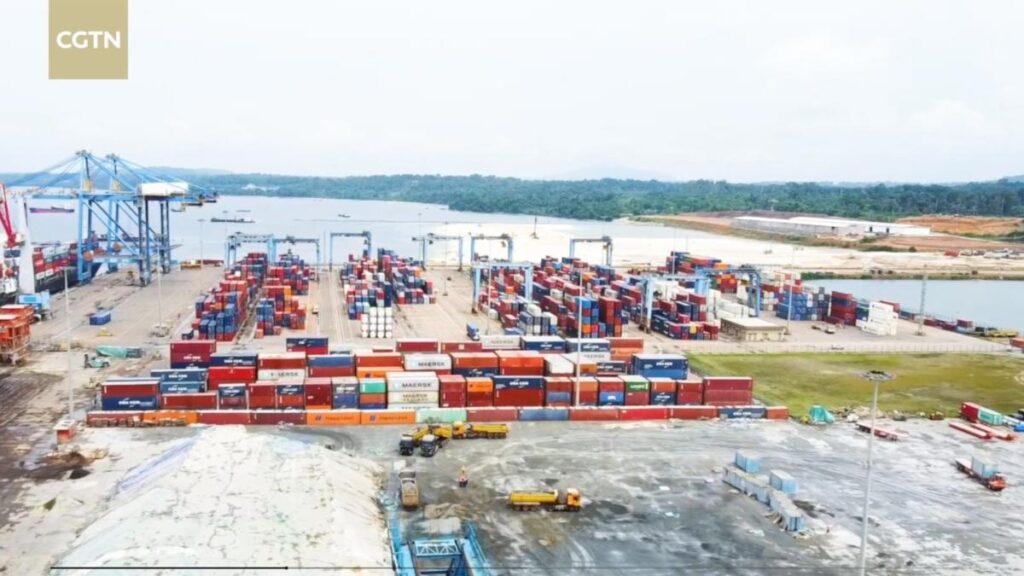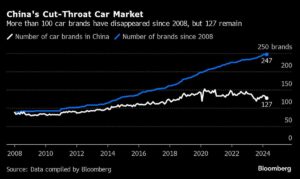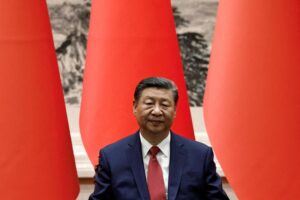A little fishing town in southwest Cameroon is depending on Chinese financing to change itself into a significant Main African sea center.
The Kribi Deep Seaport, on Africa’s Atlantic coast, is being developed by Chinese state-owned China Harbour Engineering Business (CHEC), and mostly moneyed by China Eximbank which has actually supplied around US$1.48 billion over the previous years.
It is hoped the port will offer relief to Douala, Cameroon’s primary port around 150km (93 miles) to the north, which it will work as an entrance for landlocked neighbours consisting of Chad and the Main African Republic.
Do you have concerns about the most significant subjects and patterns from all over the world? Get the responses with SCMP Understanding, our brand-new platform of curated material with explainers, Frequently asked questions, analyses and infographics gave you by our acclaimed group.
The very first stage of the port was finished in 2014 and has actually functioned because 2018. Pascal Balla Ondoua, director of research studies, tasks and cooperation for Kribi Port Authority, stated the 2nd stage of the job will make the port larger and much deeper.
“We hope that operations in the 2nd stage will begin in the very first quarter of 2025,” Ondoua informed the Post in an interview at the Africa CEO Online Forum in Kigali, Rwanda.
The 2nd stage, as soon as total, will double the port’s capability – with the hope that Kribi will then draw in more transshipment freight and bigger vessels.
It is something the Cameroonian federal government is counting on, according to Ondoua.
The broadened port, enhanced roadway network and a commercial zone near the port need to all interact to enhance the monetary fortunes of Kribi, which is presently best understood for its palm-lined sandy beaches that draw in travelers, and for its fishing market.
Passing the schedule, Ondoua stated: “CHEC will finish works at the brand-new terminals by the end of the year and after that business activities will start next year.”
The 2nd stage of the job will see the quay line extended, with another 700m (2,296 feet) to be dedicated to container traffic along with storage locations covering more than 30 hectares (74 acres).
As part of the growth, CHEC is likewise developing an aluminium terminal and a hydrocarbon terminal, extra structures, extending roadways and getting more handling devices such as wharf gantries and park gantries.
There are likewise 2 overseas terminals utilized for the export of oil from Cameroon and Chad, and an overseas gas terminal for liquefaction and export of gas by Golar LNG and Perenco – melted gas manufacturers in Cameroon.
“Our aspiration is to end up being the logistics center in the area. We currently get a great deal of transshipment freight predestined to other ports,” Ondoua stated. “When Gabon had problems in 2015, a great deal of freight was delivered by means of Kribi. However we likewise get products for Nigeria.”

Kribi Deep Seaport quay will be extended by 700m to accommodate more container traffic under the 2nd stage of the growth. Image: CGTN alt=Kribi Deep Seaport quay will be extended by 700m to accommodate more container traffic under the 2nd stage of the growth. Image: CGTN>
Kribi port is among the Belt and Roadway Effort tasks that show a funding design acquiring use amongst Chinese business and lending institutions, in which Chinese business move beyond simply engineering, procurement and building (EPC) agreements to diversify into direct ownership and operations.
According to the China Africa Research Study Effort (CARI) at Johns Hopkins School of Advanced International Researches, the Cameroon federal government at first meant to award the operation of Kribi port to a consortium of 2 French business. However when Eximbank required that CHEC likewise take part, the Chinese specialist signed up with as a small investor in the port operation joint endeavor with a 20 percent stake.
CHEC, together with French group CMA CGM and its subsidiary Bollore Transportation & Logistics, were approved the financing and functional rights of Kribi Container Terminal for 25 years under a public-private collaboration.
Over the previous years, Cameroon has actually obtained around US$1.48 billion from China Eximbank to construct the very first and 2nd stages of the port, along with a significant highway leading up to it.
China Eximbank is supplying 2 loans worth US$674.5 million in all – a US$524.5 million preferential export purchaser’s credit and a US$150 million concessional loan for the growth of the port. It had actually advanced US$423 million for the structure of the very first stage.
A 2023 research study by CARI stated Chinese banks needed Chinese specialist’s participation in both building and operation as a requirement for providing to abroad train tasks.
Ondoua stated the Chinese business likewise developed the Kribi-Lolabe highway to link the port to other parts of the nation. China Eximbank advanced US$385.8 million for the building of the highway, which works as a crucial traffic artery in the Kribi area.
“They are likewise assisting us establish land at the port. They are great partners in establishing our port,” Ondoua stated, describing CHEC. “Our cooperation with China currently has great outcomes.”
He stated the very first stage of the port has actually currently brought in financiers in cement, agribusiness and cocoa processing.
“We wish to establish more areas for financiers,” he stated, flagging a significant strategy to establish 1,500 hectares of land in the Kribi Industrial Zone.
The Kribi Port Authority has actually because signed memorandums of comprehending with companies consisting of CHEC, pan-African commercial zones designer Arise, and Tanger-Med, a Moroccan commercial port complex, to establish the Kribi Industrial Zone.
Ondoua stated a variety of other Chinese business had actually revealed interest in Kribi port.
“We have actually been getting delegations of Chinese business who wish to establish factories,” Ondoua stated.
“Among the primary locations of advancement in our port is minerals, specifically iron ore. Among the business that will establish and handle iron ore is a Chinese business,” he stated, describing the enormous iron ore tasks near Kribi that have actually brought in Chinese organizations.
A subsidiary of the state-owned Chinese miner Sinosteel Corporation Limited is establishing the Kribi-Lobe iron ore mine, simply 40km from Kribi. In 2022, the Cameroonian federal government signed a US$680 million iron ore mining handle Sinosteel to draw out 10 million tonnes of iron ore each year for twenty years.
This post initially appeared in the South China Early Morning Post (SCMP), the most reliable voice reporting on China and Asia for more than a century. For more SCMP stories, please check out the SCMP app or go to the SCMP’s Facebook and Twitter pages. Copyright © 2024 South China Early Morning Post Publishers Ltd. All rights booked.
Copyright (c) 2024. South China Early Morning Post Publishers Ltd. All rights booked.



